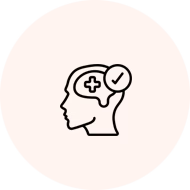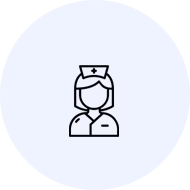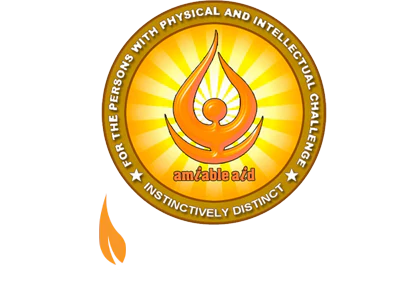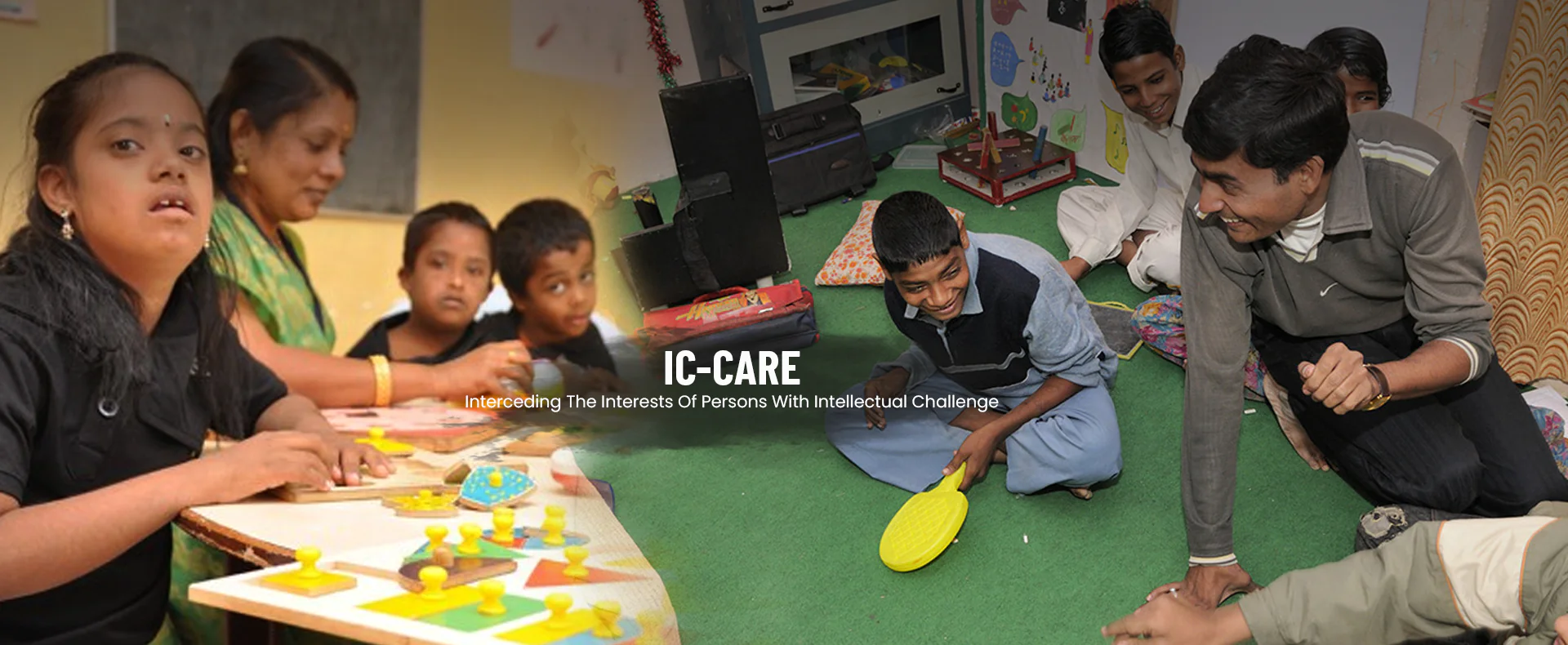IC-CARE - Interceding The Interests Of Persons With Intellectual Challenge
Ensuring Inclusivity and Dignity for All: amiableAID’s Commitment to Supporting Individuals with Intellectual Disabilities
"The inherent right of all citizens, regardless of gender, to share in the rich blessings of a fulfilling life is a fundamental principle upheld by our society. Education, an invaluable gift of our nation, is open to all, including those who need additional support. Regardless of whether someone has a visual, hearing or other form of disability, we work tirelessly to provide them with a specialized education, even if it comes at a significant cost. We also refuse to abandon those among us who face the challenges of poverty and intellectual disability, as they are among the most vulnerable and marginalized. They are born into a difficult situation, often abandoned by their peers and unable to climb the pedestal of humanity on their own. It is our moral duty to stand up for them and spare no effort or means to ensure that they are not condemned to a life without dignity and compassion."
After the initial phase of tsunami response, the different level of sensitivity incites amiableAID to bring the interests of mentally disabled children and adults to the forefront.
Intellectual disability is deeply stigmatizing. The presence of such a family member cruelly deprives even the family of a socially satisfying and economically productive life. A large proportion of patients require continuous care and year-round medication.
Between the tsunami and pre-existing complex humanitarian emergencies, many mentally disabled children and adults who survived the tsunami had to cope with a range of limitations. Both the mentally disabled and their families often face scorn, ridicule, fear, and rejection because of lack of awareness of the rural society. These stigmatizing influences make life miserable for them and their families and contribute to their difficulties.
amiableAID is committed to helping people with intellectual disabilities grow up in their own families. However, a major concern for parents is the possibility that their disabled child will outlive them. The question “What will happen to my son or daughter when we are gone?” keeps bothering them as they and their child grow older. In addition, families often face the problem of having to arrange temporary care outside the family during times of crisis, family celebrations, travel, and other situations. There are also families who find themselves in a very difficult situation and for whom the care of their disabled member becomes impossible. Even families who are very committed and take good care of their disabled member feel the need to be relieved of care for a short time to avoid burnout.
Children with intellectual disabilities were supported in tsunami-affected areas through the foster home operated by amiableAID; very disadvantaged cases have been rendered with monthly payeeship assistance.
A group of trained volunteers from amiableAID assisted families with MR a range of educational materials. In addition to working closely with families, the project intervention has also raised awareness of the needs of these children and sensitized communities. The early intervention creates appropriate care and education facilities for the children with intellectual disabilities.
As an extension of its projects, amiableAID establishs a care home with research programs and a vocational training center for people with physical and intellectual challenge and old age home at Sothupparai, Periyakulam, Theni district.
The first step to recieve services is to contact amiableAID. Once contact is made, a process called “intake” begins.
During this process, amiableAID gathers information about the person requesting services, helps the person fill out application forms, and provides information about programs.
amiableAID plans and promotes many different service options based on the needs and choices of individuals with intellectual disabilities and their families. The goal is to give individuals the opportunity to determine their own lives as much as possible in the least restrictive environment.
amiableAID recognizes the importance of involving individuals and their family members in the planning, development and monitoring of the service system.
Individual Rights, Promotion of self-determination, Respect, Optimal health and safety, and Community inclusion, utilizing neutral supports and general community services to the greatest extent possible.
amiableAID lists basic principles that should be followed when providing services, such as:
- Flexible and stable service systems that promote advocacy, effective communication, and targeted outcomes,
- continuous evaluation and improvement based on best practices and research;
- Early identification of needs, including prevention and early intervention services and supports;
- Timely response to the needs, rights, and wishes of the persons served;
- Treating service recipients and families with dignity and respect;
- Protecting persons served from abuse, neglect, and exploitation;
- Accurate and responsible accountability for the use of public resources;
- Ongoing training and qualification of the workforce; and
- Cultural competence of individuals providing services.
"AmiableAID: Prioritizing Urgent Needs"
Services from amiableAID are available when someone is eligible. amiableAID maintains a waiting list for services and has established specific criteria for determining need. Once the application for services is complete, a specialist reviews the application and assesses the person’s overall need for services against the criteria. The request is then assigned to a category of need. The person who has multiple urgent problems that could lead to a crisis situation if not addressed immediately is given first priority.
Services beyond support coordination and case management are based on the needs of the individual. Other services offered by AmiableAID include:
AMIABLE AID'S SERVICES
- Institutional long-term services
- Facility-based services
- Home and community-based services
- Consumer-directed services
- Family support Early intervention services
- Mental health and behavioral health
- Vocational rehabilitation and training Special education Health care
RESIDENTIAL CARE
Assisted Living and Habilitation
This residential service provides what is needed to help a person learn, maintain, or improve the skills needed to live in a home and community setting that the person controls and is responsible for. This service includes assistance with activities of daily living (bathing, dressing, grooming, eating and preparing meals) and household chores that are important to the health and safety of the beneficiary. Managing the budget, assisting with appointments, and building interpersonal and social skills are examples of individual needs that can be met as part of this service.
Residential Supports under the Family Model
This service helps the individual maintain or improve the skills needed to live successfully in a family. In this model, the individual lives in the home of trained caregivers who are not family members.
Medical Residential Care
This service is provided in a residential setting where everyone needs skilled nursing services in addition to the services and supports that help the individual learn, maintain, or improve the skills needed to live in the community.
DAY SERVICES, RESPITE SERVICES, PERSONAL ASSISTANCE
Day Services
Individualized services and supports that help individuals learn, maintain, or improve skills needed to live in a community setting, participate in community-based activities and use community-based resources, find and keep a job, and participate in retirement activities.
Respite Services
Services that provide care to an individual when caregivers are unable to provide care for reasons such as illness or death, or when caregivers need a break from routine caregiving tasks.
Behavioral Respite Services
Services that care for a person who is experiencing a behavioral crisis for which it is necessary for the person to temporarily live elsewhere to resolve the crisis. Behavioral Respite Services are provided in a setting where staff are trained to deal with behavioral problems.
Personal Assistance
Assistance with activities of daily living (bathing, dressing, grooming, eating and preparing meals); household chores necessary for health and safety; housekeeping; assistance with keeping appointments and building interpersonal and social skills.
PROFESSIONAL SERVICES

Behavioral Services (BS)

Nursing Services (NS)

Physical Therapy (PT)

Occupational Therapy (OT)
BEHAVIORAL SERVICES
Assessment and treatment of behaviors that pose a health or safety risk to the person or others and/or behaviors that significantly interfere with home or community activities;
- Identification of situations in which such behaviors occur and events that may lead to those behaviors.
- Development, monitoring, and revision of crisis prevention and behavior intervention strategies.
- Training of persons responsible for the person’s care in prevention and intervention strategies.
NURSING SERVICES
Skilled nursing services provided directly to the person as ordered by a physician. Examples include changing dressings and administering gastrostomy tube feedings.
Physical Therapy (PT)
PT includes assessment, diagnostic and treatment services. These services can help a person improve his or her ability to move in a variety of settings, including home, school, work, and recreational activities. These services are provided to improve or maintain current functional abilities and to prevent or minimize loss of function.
Occupational Therapy (OT)
OT Services include assessment, diagnosis and treatment. These services are provided to improve or maintain current functional abilities and to prevent or minimize loss of function.
SPEECH, LANGUAGE and HEARING (SLH) SERVICES
SLH services range from providing effective communication methods, such as sign language, to assisting with safe swallowing. Audiologists address hearing problems and evaluate devices that help people hear well. These services help individuals improve or maintain their current functional abilities and prevent or minimize loss of function.
ORIENTATION and MOBILITY TRAINING
This service involves assessing the ability of a severely visually impaired person to move independently, safely, and purposefully in the home and community environment. Orientation and mobility counseling, as well as training and education of the person and the caregivers responsible for assisting the person, are also part of this service.
NUTRITION SERVICES
Assessment and evaluation of nutritional needs, nutrition counseling and education for the individual and for those responsible for purchasing food, preparing food, or assisting the individual with food intake. These services must be provided by a registered dietitian or nutritionist. These services must be prescribed by a physician.
PLEDGE YOUR SUPPORT
Support GITGOH: GIve The Gift Of HealtH!
Transform health tourism in Tamil Nadu with us. Exceptional facilities await you in the serene Aghamalai Hills:
Poongaviyam Haven: Senior care.
Azure Bliss: A tranquil sanctuary for holistic recovery.
Milirkanagam: Ancient healing and Tamil Siddhar wisdom.
Aghamalai Pizhisal: Revitalizing therapies and more.
White Noise Breathing: Siddhar's path of meditation.
Milirkanagam and white noise breathing promote well-being. Our approach combines medication and meditation for rejuvenation. Milirkanagam Strengthen us, fight disease and relax with calming white noise breathing. Experience a unique wellness journey that combines ancient and modern practices. Support GITGOH for better health.
Get In Touch
Amiable Aid Foundation
Aghamalai Road, Sothupparai Dam, Periyakulam Taluk, Theni District - 625601
It is a noble endeavor taking shape in this present period that everyone should be proud to participate in and contribute to.
Support our project to enhance well-being, boost the local economy, and preserve Tamil Nadu's cultural heritage. Funders gain exclusive access to these exceptional facilities.
Join us in creating a lasting legacy of health and wellness. Give the Gift of Health through GITGIOH!
Invest in the future of health tourism. Contact us for more information.

Dear Friend,
To experience the website, please turn on the volume.
If you plan to visit the website with volume muted, please click here.





